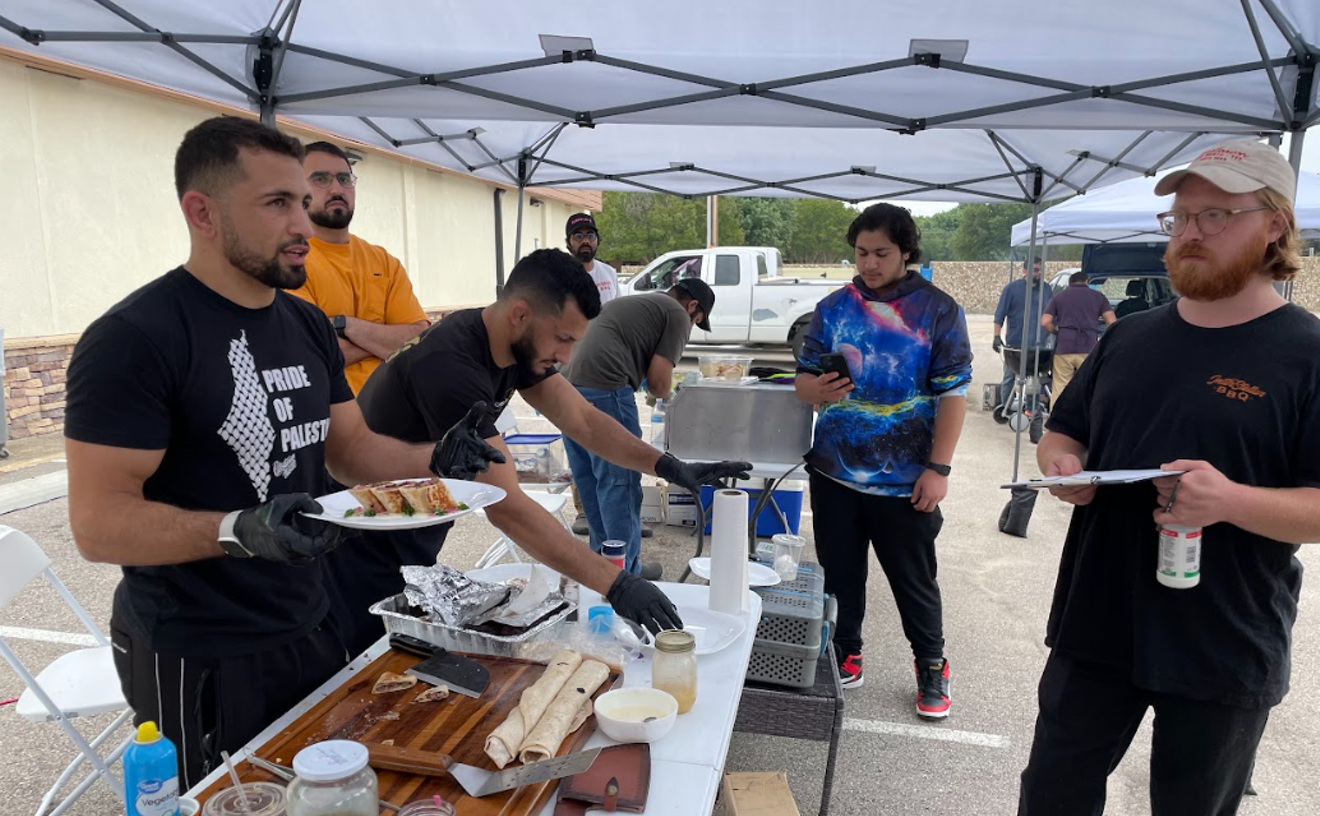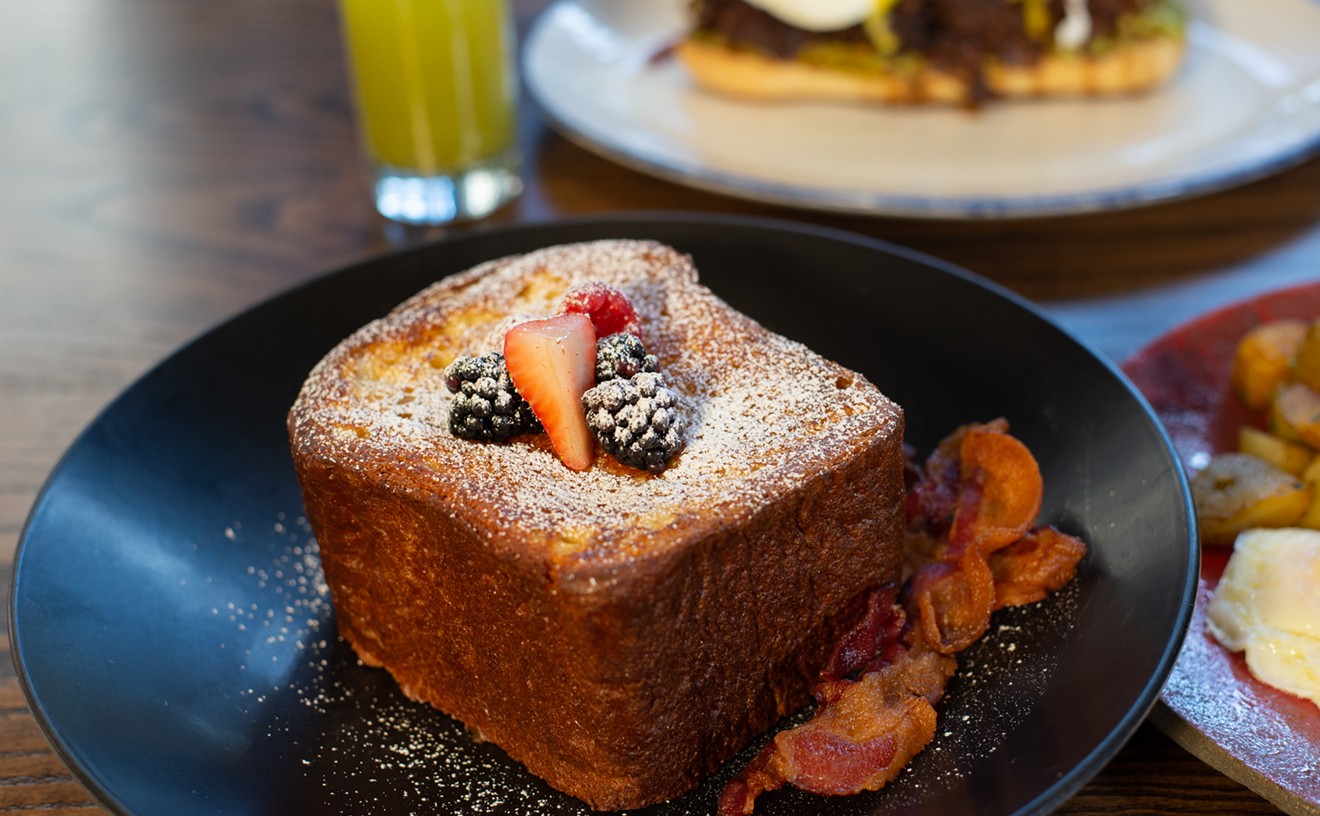It has been said many times before that pastry is very much a neglected part of the culinary world, at least in the United States. Pastry chefs are among the most revered culinarians in France, but folks in the States were perfectly happy to eat grocery store cake for decades. Now, as the country's culinary renaissance continues, our palates have changed. Pastry is in, and the chefs that so expertly and precisely bake it are finally getting the spotlight they deserve.
In the opening of Remedy, Pastry Chef Guillermo "Gmo" Tristan's decadent retro-themed desserts got top-billing alongside Chef Danyele McPherson's comfort food. And for good reason. Tristan is known as one of Dallas' best dessert makers, and the menu at Remedy shows off those skills. Now that Remedy has been open a few weeks, I sat down to talk with Tristan about his background in the pastry industry, how he built the menu at Remedy from family memories, and why he eschewed culinary school for real-world kitchen experience.
You've made the rounds at some of Dallas' best restaurants in a number of kitchen capacities. Can you talk a little about your experience as a chef? I went to culinary school for a little bit, but most of my training was on-the-job. I originally started at Hibiscus when they first opened, and then I went on a little bit of a hiatus and lived in Montauk for a few years. When I came back, I worked at a few odd and end type jobs, but the real highlight was working at Charlie Palmer at the Joule. I originally started there as a pastry cook, and I worked my way up a little bit.
I worked there for two and a half years, and then I was promoted to banquet chef and thrown back into the savory side of things. I was out of pastry for a while, but I always had this desire and knew that's what I really wanted to do. I left Charlie Palmer and went to Boulevardier for about two years still doing savory food, and then did a short stint at FT33. I learned a lot from Matt McCallister and Maggie. Watching them plate and see how they do their food was just really cool. Everything that I've brought into Remedy has built from all those experiences.
It seems like there a lot more culinary school drop-outs than there used to be, and many of those people have gone on to do very well for themselves. I'd say that you're one of those people. Do you regret not going to culinary school? No. Well, that's kind of a two-sided answer. There's a part of me that wants that piece of paper, but there's another part of me that knows that I'm so far into it now that it would be stupid for me to stop what I'm doing and go back to school. Culinary school isn't going to teach you what a working restaurant is going to be like. They're going to teach you the basics and how to do certain procedures.
Were there any techniques that were difficult for you to pick up on once you started working in kitchens because you didn't have that culinary school background? There were a few. Not so much in the world of pastry, but definitely in terms of charcuterie. I haven't done a ton of it, even though I worked with it some at Boulevardier, and I picked it up really quickly. It's still not one of the things that I really excel at. There are people who are really amazing at charcuterie, like Danyele [McPherson] and Matt [McCallister]. Being able to watch them and do something repetitively to actually get to that level was hard, but I worked a lot.
It seems like you're pretty equally skilled in savory food and pastry. What makes you gravitate toward pastry? I can bring a lot of things from my childhood into pastry. I always think about my family. Bringing those flavors into play, something that's sparked from a memory. I cook a lot and play around in the kitchen with my wife, so we come up with a lot of ideas from there. My mom and grandmother were cooking all the time, and they would show me things from time to time. They weren't culinarians, we weren't pastry people, but whatever my mom knew, she would give me. And I've taken that. Heavy cinnamon, lots of cream and butter. Those are definitely things that I got from her.
Are there any specific dishes on the menu that are from your childhood? I haven't really taken anything from my own childhood. Lately, it's been more about my son's childhood and playing with flavors that he will enjoy. I've got a currant sundae coming up soon, but they're flavors that he would definitely enjoy. I take cues from what he wants to eat and kind of play with those flavors.
When Remedy was announced, the desserts were very much a focal point of what the restaurant was going to be doing. That seems to rarely be the case. Was it deliberate, the assertion that Remedy is just as much a dessert spot as it is a place to have a fine dinner?
I would say that we set out to showcase all the food in general. Dany's got a lot of great dishes, but we wanted to bring the soda shop, diner-esque feel in as well. We've got ice cream and soda and pies as the focal point.
Where does the inspiration for your menu come from? I would say that at least 25% of the menu comes from playing around in the kitchen with my wife. She'll kind of watch me, and suggest a flavor that no one else is doing, and we try to figure out how to make it work. I draw a lot of inspiration from her on that. There's also pieces of my background on the menu, like with the s'mores pie. FT33 did a great s'mores dessert when I was there, and I sort of turned it into pie form. I owe that one to the team there, because they created this really amazing dish that inspired me.
The desserts here harken back to a different time. They're 1950s, 1970s comfort food. What about that style appealed to you as a chef? That's a little bit of a loaded question. If I was cooking at home, this is the food that I wanted to make. If I'm cooking for my kid, grilled cheese, bologna sandwich, the burger -- these are all dishes that I would take my son out to eat. Even down to the fish filet, everything is just very approachable and delicious. This is what I would be doing at home, and that's what makes it so comfortable. We could make our food complicated and plate it all elaborately, but I just want to come in and eat. I just want a really good fish sandwich or market cut of meat.
Are you working mostly on the dessert side of the restaurant, or do you kind of do everything? I help out where I can. I do some expediting during lunch, and there are some savory elements that we actually create for the menu. We make the ancho spoonbread that goes on top of our pork dish, and we bake all the vegetarian pie shells.
The cocktail menu is also pretty diverse, and incorporates elements that you likely have your hands in. Do you help bar manager Mate Hartai with the sweet elements on his menu? The most I really help is contributing the ice creams for certain drinks. We haven't really reached a point where we're working together. He still has a lot going, and so do I. Eventually that will come, but when I initially started, I introduced a series of syrups and now they're using them. We did a dark chocolate syrup for the egg creams, and a really good cream-down butter scotch that goes on the egg cream as well.
Do you plan to add any modern twists to the retro-themed menu here? I don't think so. I already have it going, and trying to change it up would defeat the purpose of what we started out with. We want our menu to appeal to everyone, but we're not going to change it in any drastic form to make it modern. We want it to be approachable, and these desserts are approachable.
How did your relationship with Executive Chef Danyele McPherson come about? When I was still at FT33, I had gotten a small taste of working in pastry and knew that it was what I wanted to do all the time. She sent out an email looking for someone that was knowledgable in pastry, and that's what I wanted to get back into. I was having fun at FT33, and I wanted to get back into that. I had a lot of fun working with Ruben Torano at The Joule, and I wanted to have that fun again. I called her back, and told her that I thought I could be a good asset for her restaurant. I just kind of followed my gut because I thought it would work.
How is your working relationship with McPherson? Really good. There's not a lot of yelling. Yeah, you're hollering out tickets but we get along for the most part. My pastry chef is kind of stern, but that's probably because I can work messy. We try to stay on track with each other, and I really love working with everybody here. Dany's a really good pusher. She knows what she wants, and whatever I can do to deliver, something seems to work.
That's something that I've heard from other people, that Danyele can be intense in the kitchen. Anyone can be intense in the kitchen. I can be intense in the kitchen if I'm doing 20 things at the same time.
I guess after working with Matt McCallister, intense is something you're pretty used to. Oh yeah. Matt is pretty intense, but so was Scott Romano at Charlie Palmer. That's what fuels your kitchen, though. Otherwise, it's not good. Having a laid-back kitchen isn't what you're expecting. You need that intensity to put that food on the plate and serve it well.
You've got a pretty laid-back personality, maybe you're the one that adds the balance? I am pretty laid back, but when it really hits the fan, I just try to keep my head above water. I can lose myself and start four different things at the same time, and I can be intense. Any cook that's in my way, I feel bad because they've gotta move out of my way sometimes. But it's all in how you present yourself. If you're intense and stressed out all the time, it's going to show. I have to remember to keep my intensity in check because if I'm angry or stressed, it's going to show on the plate. Which means that the diner is going to taste that.










